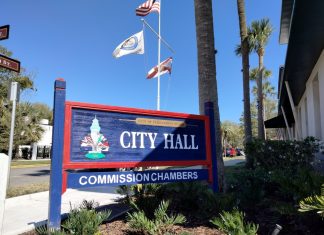By Lesley Arrandale
mail@floridanewsline.com
As forecast, some parts of the country have experienced severe weather this winter, but as of early February, at least in my neighborhood, life here has been less harsh. Cold fronts have come and gone, preceded by much needed rain, but hard freezes haven’t been widespread. Now I see mid-week temperatures are expected to reach the high 70s, which is far from seasonal.
Once the middle of March is past we can usually expect frost-free nights. Vegetable growers may have got a jump on the season and are nurturing seedlings of warm-season crops under grow-lights, but weather can be fickle, so we need to pay attention. Whether you grow vegetables from seed or choose transplants from the store, planting out before the soil has warmed sufficiently can slow down growth.
For tomatoes, which might succumb in mid-summer to insects and disease, a cautious approach to planting out is advisable. If plants are showing signs of outgrowing their pots before the weather warms up, simply pot them on to avoid stunting their growth. Introduce them to the great outdoors gradually, getting them accustomed to temperature changes, bright sun and breezes.
If you are unsure of which varieties to choose, The Florida Vegetable Gardening Guide is very informative, but finding those desirable seeds is not always easy. For guidance, refer to https://edis.ifas.ufl.edu/ep486. The tables cross reference different varieties with suppliers, doing some of that detective work for you.
Whatever you grow, our sandy soils need replenishing as nutrients are easily leached out by heavy rains. The organic material in homemade compost can help soil to retain moisture longer, and it makes sense to compost what we can from our kitchen scraps and garden waste to recoup valuable nutrients. Vegetables can be heavy feeders, though, and an application of a simple 10-10-10 or similar fertilizer a week or so before planting out is advisable. For gardeners who prefer organic fertilizer, there are several brands which are readily available.
There is much interest in native plants and how they can support wildlife, particularly pollinators, but have you ever wondered what your own backyard may once have been like? Looking at a map of plant communities in Florida (http://tinyurl.com/zsd2qhd), I discovered that where I live is probably a sand hill. Certainly I never find standing water in my yard, as sometimes happens in pine flatwoods, which occur a little farther south. There a hardpan layer that exists at varying depths below the surface and drainage can be badly affected. In both these natural habitats, some plants are dependent on fire to survive, which is not exactly to be encouraged in our neighborhoods.
I was interested to see that some of the plants I’ve been successful with are indeed native right here, notably beautyberry (Callicarpa americana), coral honeysuckle (Lonicera sempervirens), Carolina jessamine (Gelsemium sempervirens), Georgia calamint (Calamintha georgiana), wild petunia (Ruellia caroliniensis) and beardtongue (Penstemon multiflorus).
I can add to that list pokeweed (Phytolacca americana), which is a mixed blessing if you know the plant. Birds adore the fruit and as a result you can rely upon it to come up everywhere. Thankfully the young seedlings are shallow-rooted, so unwanted plants are easily disposed of. But beware, if left to develop, they grow a large tap root which is not so easily tackled.
After years of cultivation, our soils have been altered and most of our yards bear little resemblance to the original landscape. To make the best of our plantings we need to assess the current state of our soil, our sunny and shady areas, and, as always, choose the right plant for the right place.
Lesley Arrandale is a Master Gardener with the Duval County Cooperative Extension Service/City of Jacksonville Agriculture Department, which is a partnership between the United State Department of Agriculture (USDA), the University of Florida Institute of Food and Agricultural Sciences (UF/IFAS) and the City of Jacksonville.











